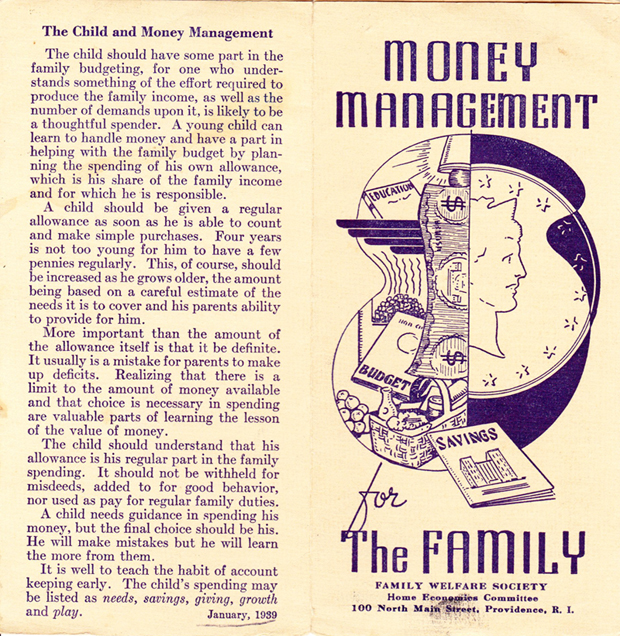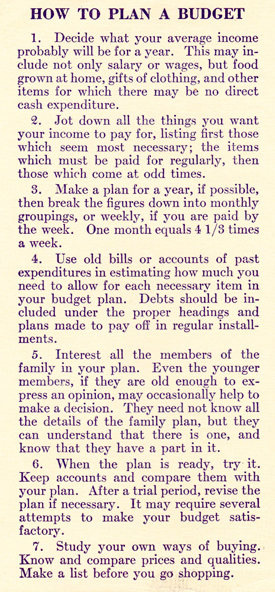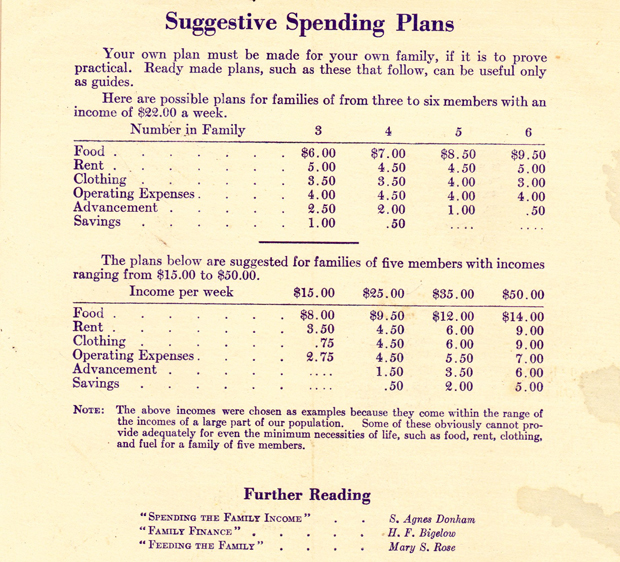[share_sc]
Note: This is a post from Joan Concilio, Man Vs. Debt community manager. Read more about Joan.
A couple of months ago, Chris and I were browsing in a local antique store and he picked something up and said, “Hey, Joan, this is totally a Man Vs. Debt post!”
He’d found a 1939 pamphlet on “Money Management for the Family.” He loves old books and papers, and while he can blog about literally anything, I think he was mostly kidding.
The thing is, it turns out that MUCH of the advice is truly timeless and, dare I say, even a little familiar-sounding, so I thought it’d be fun today to share a few highlights.
And for more Family finances and budget chat, check out the Clever Dude blog. You will love it!

- “The child should have some part in the family budgeting, for one who understands something of the effort required to produce the family income, as well as the number of demands upon it, is likely to be a thoughtful spender.” Oh, wait, that sounds familiar!
- “The child should understand that his allowance is his regular part in the family spending. It should not be withheld for misdeeds, added to for good behavior, nor used as pay for regular family duties.” This, by the way, is a subject for a whole separate post, but we don’t do allowance-for-chores in our house, following almost exactly this system!
- “A child needs guidance in spending his money, but the final choice should be his. He will make mistakes but he will learn the more from them.”
- “The best plans are developed in a family council… everyone either shares in making the plan or knows enough about it to appreciate both the limitations and possibilities of the income.”
- “The council plan may result in the family’s working together, each one watching his spending to accomplish a desirable future goal which might be difficult to attain otherwise.”
I love the last one most of all. I’ve said before that one of the best things about our family’s debt-payoff efforts is that we’re a team. We are more than the sum of our parts, and we are so grateful for it!

On budgeting
- “Your budget should include everything for which you spend your money.” Oh, so simple, but so many of us don’t heed this advice!
- “Decide what your average income probably will be for a year… (then) jot down all the things you want your income to pay for, listing first those which seem most necessary; the items which must be paid for regularly, then which come at odd times.”
- “Use old bills or accounts of past expenditures in estimating how much you need to allow for each necessary item in your budget plan.”
- “With a weekly income, reserve your rent weekly. An old rule, and a good one, is never to pay more than a week’s wages for a month’s rent.” It was an old rule then – and it’s STILL a good one today.
- “If you own or plan to buy a house, consider regular payments on mortgages, interest, taxes, water bill, insurance and upkeep and repair as rent.” While talking to my mom about this post, she pointed out that owning a home when she was growing up was almost unheard-of. Hmm. I think there’s value in not “defaulting” to a mortgage!
- You are not your budget. You are a person.
On having a plan
- “A family account book is the first step toward successful money management for the family.”
- “To get the most for your food money… plan menus ahead; shop for best prices; prepare the food so that it will be appetizing; buy in quantity if you have storage space; use left-over food.” This is a huge one for us. We have a grocery-shopping system and tons of ways to make sure we’re using all our leftovers.
- “Plan the clothing needs of each person for a year. Save weekly to meet those needs… Decide whether you want to spend your money for style, wearing qualities, or both.” I’ve talked about this in detail before – that our clothes-buying is frugal, but not always cheap!
- “When the plan is ready, try it. Keep accounts and compare them with your plan. After a trial period, revise the plan if necessary. It may require several attempts to make your budget satisfactory.”
Just for fun
Check out the “Suggestive Spending Plans” here – for an income of $22 a week! Our family of four, at that time, ought to have been spending $7 of our income, almost a full third, on food – more than the $4.50 we’d want to allot for rent or housing. I love that we would be planning 50 cents for savings. That matters – it’s more than 2{c87e2df4b343d0515d304e127afe4653a549475791ab451641a18e09bd64e760} of that income, and I humbly submit that most of us aren’t saving at that rate now! What do you think about htat?

For a true comparison, I ran these through the Bureau of Labor Statistics Inflation Calculator. You might be surprised to know…
- A salary of $22 a week in 1939 would equate to the purchasing power of $368.42 a week in 2013. This is equivalent to one working adult making about $9.20 per hour – so, while low for a lot of Man Vs. Debt readers, absolutely realistic in America today.
- Using the same percentage for food, that would be $117.19 a week for our family of four. This veers lower or higher, but I think it falls in the category of “fairly possible,” especially at that salary. (I also think that for a dual-income family, this cost probably would not fully double, so that makes it even more likely to work even today.)
- Ah, but then we get to rent. Housing expenses should come in at $75.34 a week, or about $326 a month (averaged). Can you tell that housing costs have WAY outpaced inflation? Yikes!
- The same amount should be spent on “operating expenses,” which includes utilities, household supplies, cleaning equipment, furniture, phone and so on. I think we’re starting to see the areas where the modern lifestyle is harder to maintain!
- Finally, savings of 50 cents per week on that 1939 salary would translate into a savings of $8.36 weekly now – or about $435 per year added to savings. While I think that’s a modest goal, I wonder: Can most people say their savings increases $400 to $500 annually? I hope that in the Man Vs. Debt community, our answer is yes – or at least that we’re working on it!
[share_sc]
I hope it was kind of fun for you to see some financial advice from 74 years ago.
Any surprises – or family memories from that time? I’d love to hear your thoughts!
